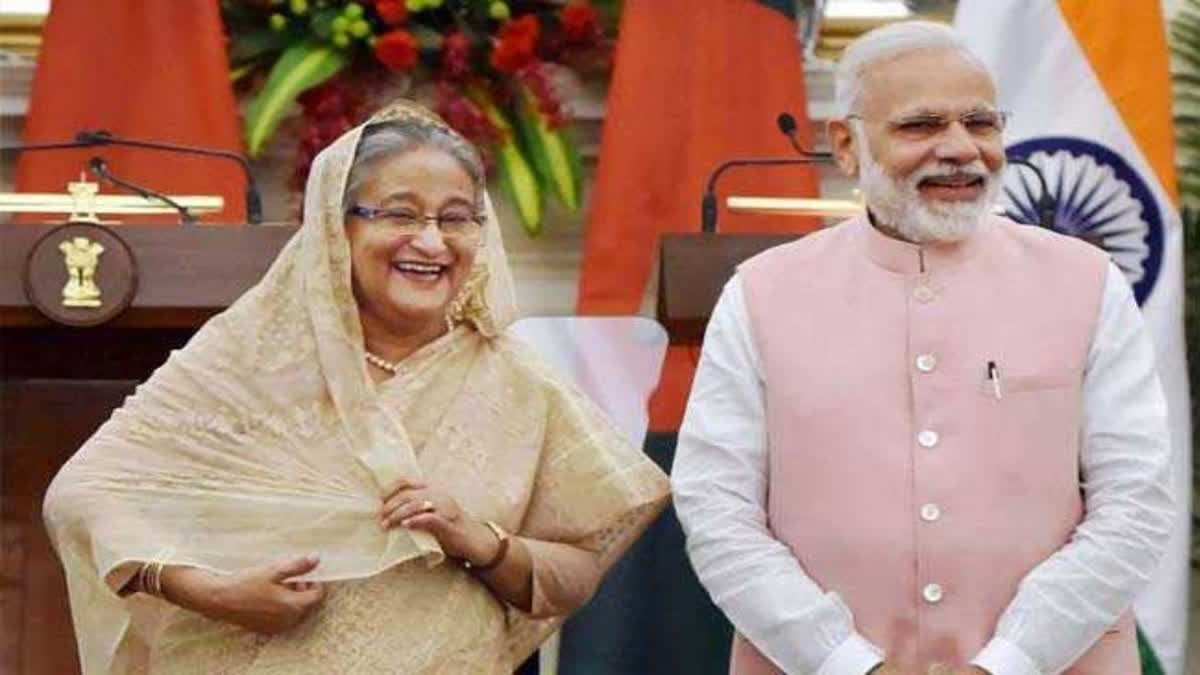New Delhi: Amid rising political tension and anti-incumbency, Sheikh Hasina-led ruling Awami League, which is facing national elections due by January 2024, is leaving no stone unturned to woo India, which has traditionally emerged as Hasina's 'saviour' in times of peril.
Speculations are rife that the coming elections may not be 'cakewalk' for Hasina like previous polls. Opposition Bangladesh Nationalist Party (BNP) is boycotting elections to extract concessions from the government on election management; rampant inflation is increasing citizens’ daily struggles; and both the BNP and ruling Awami League (AL) are holding large rallies across the country to mobilise their supporters.
A delegation of Bangladesh’s ruling party Awami League visited India earlier this month. It requested New Delhi to lift the ban on export of wheat to the eastern neighbour. The delegation, which came as part of the ‘Know BJP’ initiative, used the occasion for its interest. As usual, Bangladesh raised the blogey of 'anti-India' sentiment again. It tried to convince the Indian government in the theory that stoppage of wheat export will raise anti-India sentiments among Bangladeshi people, sources privy to the development said. Due to rapid urbanisation, rising incomes and more people joining the workforce outside their homes, the demand for wheat-made food and food products in Bangladesh is on the rise. Second to rice, wheat is one of the most important winter crops and is a temperature sensitive grain crop of Bangladesh.
In a message to its High Commissioner in New Delhi in June last year, Dhaka said that it will need to import at least 6.2 million tonnes (mt) of wheat from India in the fiscal year gone by. India had imposed a total ban on export of wheat in November last year due to surging domestic prices and the Russia-Ukraine war. However, New Delhi allowed wheat export on a government-to-government basis purely on need basis for domestic consumption and not for further export of the cereal. In November 2022, India exported 375 tonnes of wheat to Bhutan. The next month, India exported 391 tonnes of wheat to Bangladesh and Bhutan.
After China, India is the second largest producer of wheat. In the last 20 years, India produced 12.5 per cent of the world’s wheat total with 1.8 billion tonnes but it also consumes most of what it grows. An agricultural scientist explained to ETV Bharat that India primarily produces three types of wheat – chapatti wheat, durum or kathia wheat and khapali wheat.
Chapatti wheat is mainly grown in Punjab, Haryana, western Uttar Pradesh, and Rajasthan and is used to make roti, bread and biscuit. Kathia wheat is grown in Madhya Pradesh, Gujarat, Rajasthan and Maharashtra and is used for making pasta, semolina (sooji), and dalia. Khapali bread is mainly grown in peninsular India in states like Karnataka and Maharashtra and is used to make rawa and dalia.
It is the chapatti bread that is most in demand in countries of South Asia like Bangladesh, Nepal and Bhutan. It is good for diabetic people, the scientist explained. Indian scientists are now making wheat varieties that are climate resilient and are bio-fortified, according to the scientists. India has become a technology provider and is helping other countries for food security.
Apart from India, Bangladesh is also dependent on Russia and Ukraine for wheat imports. While Russia is the third largest producer of the cereal, Ukraine is the 10th. However, with Russia pulling out of the Black Sea Grain Initiative last month, there has been a rise in demand in the world wheat market.
In July last year, the UN helped broker a lifesaving deal between Ukraine, Turkey and Russia that enabled Ukraine to resume shipping millions of tonnes of desperately needed grain exports through the international waters of the Black Sea. The deal unlocked millions of tons of desperately-needed grain and other foods that would otherwise be stuck in Ukraine. The Black Sea Grain Initiative was intended to help people in need across the globe by directly delivering desperately-needed grains to lower-income countries and bringing down food prices.
On July 14 this year, Russia announced that it would no longer guarantee the safety of shipping through the Black Sea. The decision came following blasts on the Kersch bridge, that links Russia to the Crimean peninsula. A furious Russian President Vladimir Putin said that the year-old Black Sea Grain Initiative was detrimental to his country’s interests.
According to reports, during the course of its visit, the Awami League delegation conveyed to the BJP leadership that stopping exports of wheat and other essential items of daily use leads to resentment against India among people in Bangladesh. BJP president J.P. Nadda has reportedly assured the delegation that he will take up the issue with the Indian government. Bangladesh Prime Minister Sheikh Hasina, who has deftly portrayed herself as 'pro-India' though largely for political gain, a fact that a large section of Indian establishment understands. So, whenever supply of essential items like wheat from India gets cut, the opposition tends to capitalise on it. With elections around the corner, Hasina, who is scheduled to visit New Delhi next month, would like India to resume export of wheat to Bangladesh.



